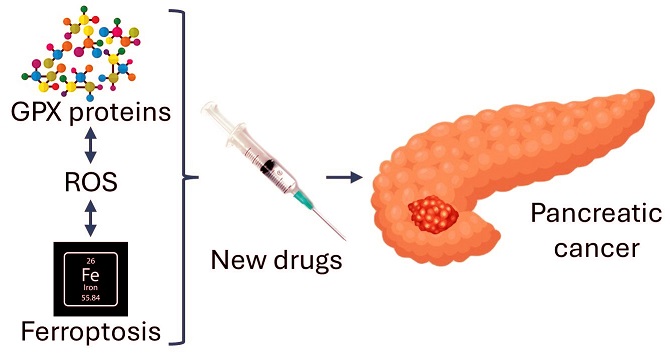Targeting glutathione peroxidase as a game-changer in pancreatic cancer treatment
Nikhil Prasad Fact checked by:Thailand Medical News Team Nov 17, 2024 4 months, 3 weeks, 5 days, 10 hours, 9 minutes ago
Medical News: Pancreatic ductal adenocarcinoma (PDAC) remains one of the most fatal cancers worldwide, with a staggering five-year survival rate of just 3% for advanced cases. The absence of effective early detection methods and limited treatment options continues to challenge medical professionals and researchers alike. Surgical resection remains the only curative option, but its availability is restricted to 15-20% of patients at the time of diagnosis. Chemotherapy regimens like FOLFIRINOX and gemcitabine-based combinations offer limited survival benefits, while immunotherapies have shown minimal efficacy.
 Graphical Abstract: Targeting glutathione peroxidase as a game-changer in pancreatic cancer treatment
Graphical Abstract: Targeting glutathione peroxidase as a game-changer in pancreatic cancer treatment
A promising breakthrough, however, lies in understanding and targeting the enzyme glutathione peroxidase 4 (GPx4), which plays a critical role in the cellular oxidative balance. This
Medical News report will delve into how GPx4 and related glutathione peroxidases (GPxs) are reshaping the approach to PDAC treatment.
The Role of GPx4 in Pancreatic Cancer
Glutathione peroxidases are antioxidant enzymes that mitigate oxidative damage within cells. Among the GPx family, GPx4 is of particular interest due to its involvement in ferroptosis - a form of programmed cell death driven by the accumulation of lipid peroxides. While this mechanism protects healthy cells from oxidative stress, cancer cells exploit it to resist cell death. By detoxifying lipid peroxides, GPx4 enables cancer cells to survive and proliferate even under adverse conditions like chemotherapy-induced stress.
In PDAC, where conventional treatments often fail, targeting GPx4 has emerged as a potential strategy. The inhibition of GPx4 can trigger ferroptosis selectively in cancer cells, making it a promising therapeutic avenue.
Study Insights: A New Therapeutic Frontier
Researchers from institutions like the I+12 Biomedical Research Institute in Madrid and the Fundación Jimenez Diaz University Hospital-Spain have delved into GPx4’s potential. Their findings highlight the enzyme’s pivotal role in shielding pancreatic cancer cells from oxidative stress while maintaining their aggressive traits. By inhibiting GPx4, researchers aim to disrupt the cancer’s ability to survive, effectively pushing it towards ferroptosis.
Studies have also revealed that GPx4 inhibitors, such as RSL3 and ML-162, demonstrate significant anti-cancer activity in preclinical models. These inhibitors work by blocking GPx4’s active site, leading to an accumulation of lipid peroxides and subsequent cancer cell death. Furthermore, combining GPx4 inhibition with traditional chemotherapy drugs like gemcitabine has shown potential in overcoming drug resistance in PDAC.
GPx4’s Role in Drug Resistance and Tumor Microenvironment
One of the biggest challenges in treating PDAC is its resistance to chemotherapy. Cancer cells often adapt by enhancing their antioxidant defenses, with GPx4 playing a central role. Inhibiting GPx4 disrupts this de
fense mechanism, sensitizing cancer cells to treatments. For instance, the combination of GPx4 inhibitors with agents like erastin has been shown to deplete glutathione, a crucial antioxidant, further weakening cancer cells.
The dense and fibrotic tumor microenvironment (TME) of PDAC also poses a significant barrier to effective treatment. This environment not only limits drug penetration but also fosters immune evasion. However, targeting GPx4 has been linked to modifications in the TME, such as improved immune cell infiltration and reduced fibrosis. These changes make the tumor more susceptible to immunotherapies and other treatments.
The Future of GPx4 Inhibition in PDAC Therapy
GPx4’s involvement in ferroptosis offers a novel pathway to tackle the aggressive nature of PDAC. Ongoing research is exploring the use of GPx4 inhibitors alongside immune checkpoint inhibitors and conventional chemotherapy to maximize treatment efficacy. For example, nanoparticles loaded with GPx4 inhibitors and chemotherapeutic agents have shown promising results in preclinical studies, enhancing drug delivery and reducing systemic toxicity.
Moreover, researchers are investigating combination therapies that exploit the synthetic lethality concept. By pairing GPx4 inhibitors with drugs targeting specific genetic mutations in PDAC, such as KRAS or TP53, scientists aim to selectively kill cancer cells while sparing healthy tissue.
Conclusion: A Promising Path Forward
The research into GPx4 as a therapeutic target marks a significant step forward in addressing the challenges of pancreatic cancer treatment. By disrupting the cancer’s oxidative defense mechanism, GPx4 inhibitors hold the potential to improve outcomes, particularly for patients with drug-resistant or advanced-stage PDAC. However, translating these findings into clinical practice will require extensive trials to ensure safety and efficacy.
The study findings were published in the peer-reviewed journal: Antioxidants.
https://www.mdpi.com/2076-3921/13/11/1405
For the latest
Cancer News, keep on logging to Thailand Medical News.
Read Also:
https://www.thailandmedical.news/news/new-study-finds-link-between-high-hba1c-levels-and-pancreatic-cancer-risk
https://www.thailandmedical.news/news/the-unexpected-connection-between-covid-19-and-pancreatic-cancer
https://www.thailandmedical.news/news/new-hope-for-pancreatic-cancer-treatment-fungi-derived-bioactive-compounds
https://www.thailandmedical.news/news/aronia-berry-extract-overcomes-pancreatic-cancer-drug-resistance-via-myd88-nf-kb-p-glycoprotein-modulation
